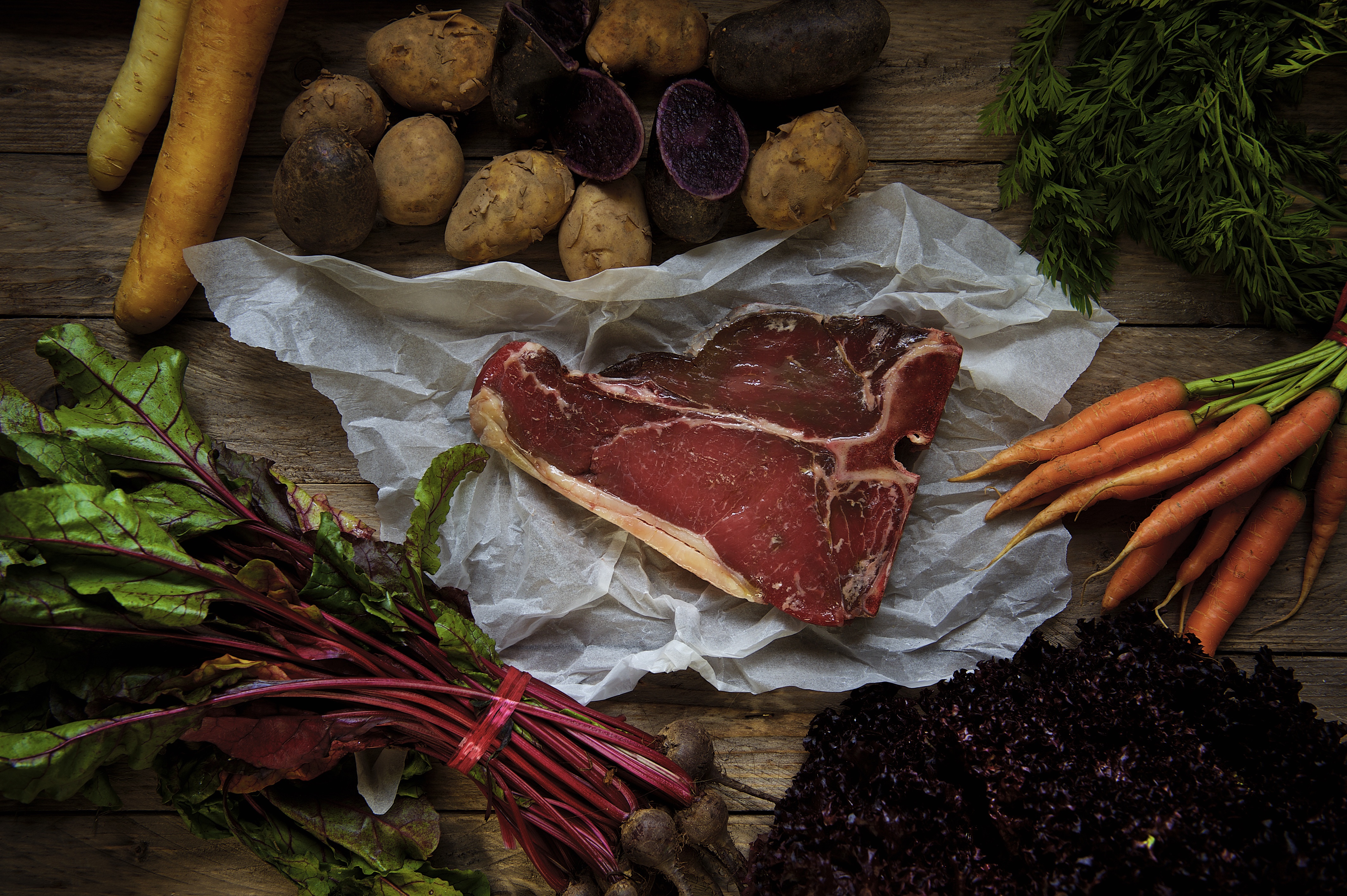 This post was originally published on Whole Health Wellness Center’s website.
This post was originally published on Whole Health Wellness Center’s website.

Historically, it has been accepted in the medical community that increased consumption of red meat increases all-cause mortality including cardiovascular disease and cancer (especially colon cancer). [1] However most of the studies that indicate such results often do not differentiate between processed and unprocessed meat or other factors that influence the nutritional quality of the meat such as a grass-based diet. Here I explore these factors and others like the impact of red meat on gut health, the planet, and take home tips for a healthy balance.
Processed vs. Unprocessed
A 2010 systematic review and meta-analysis published in Circulation showed that consumption of processed meats, but not red meats, is associated with higher incidence of congestive heart disease and diabetes mellitus. [2] Another large study (448,568 people) performed in 2013 further supported these findings that red meat isn’t necessarily to blame. Higher all-cause mortality remained significant only for processed meat. The highest causes of death attributed to processed meat consumption were cardiovascular diseases and cancer. This increased risk of death was estimated to be preventable if processed meat consumption was limited to less than 20 g/day. [3]
Grass-fed
There are other studies that have linked both red meat and processed meat to modest increases in cancer, cardiovascular disease, and all-cause mortality, [4] however these studies have not historically differentiated between grass-fed red meats and “conventionally-raised,” red meats (fed fishmeal, soybeans, corn, and other grains) when addressing long-term health outcomes. There is an important difference in the nutritional quality of these meats due particularly to omega-3 content.  Grass-fed meats are higher in omega-3s and lower in the pro-inflammatory omega-6 fatty acids. This translates to increases in omega-3 status in healthy consumers. [5] Benefits of having higher levels of omega-3 fatty acids include decreases in other cardiovascular risk markers like C-reactive protein, ferritin, and homocysteine, [6] as well as improvements in LDL (bad cholesterol), reduced inflammation, and reduced atherogenic (plaque-forming) effects. [7] [8] Omega-3s have also shown to help reduce seizures in epilepsy, mildly reduce blood pressure, improve insulin resistance (blood sugar regulation) [8] and more!
Grass-fed meats are higher in omega-3s and lower in the pro-inflammatory omega-6 fatty acids. This translates to increases in omega-3 status in healthy consumers. [5] Benefits of having higher levels of omega-3 fatty acids include decreases in other cardiovascular risk markers like C-reactive protein, ferritin, and homocysteine, [6] as well as improvements in LDL (bad cholesterol), reduced inflammation, and reduced atherogenic (plaque-forming) effects. [7] [8] Omega-3s have also shown to help reduce seizures in epilepsy, mildly reduce blood pressure, improve insulin resistance (blood sugar regulation) [8] and more!
Influences on Gut Health
A lesser known downside of high meat consumption, particularly red meat, is the impact it can have on your gut health and how intestinal health and the microbiome (gut bacteria) can influence other aspects of your health. One way meat consumption could be causing increased cardiovascular disease involves your gut bacteria. In your digestive track, L-carnitine, which is found in high levels in meat, is converted into something called TMAO (trimethylamine oxide) which is strongly associated with the development of atherosclerosis (plaque buildup in the arteries). This happens more in omnivores than vegans or vegetarians due to a mechanism involving gut bacteria. [1] Part of the health risks associated with meat consumption may in part be due to lower dietary intake of plant-based fibers that are important for maintaining healthy intestinal cells and diverse, beneficial bacteria. Studies have supported this connection showing worse outcomes with two types of irritable bowel disease (ulcerative colitis and Crohn’s disease) with higher meat consumption and improved outcomes with high fiber and fruit intake. [1]
What about the planet?
So, grass-fed, unprocessed red meat may not be so bad for your health in moderation. The health of the planet is another matter. More and more farms are turning away from models with fewer animals that are free-roaming to factory farms where the animals are in close-quarters to keep up with the high demand for cheap meat. This significantly increasing the environmental impact and livelihood of the animals and the demand for antibiotic use in the animals. Livestock contribute significantly to greenhouse gas emissions with lamb, beef, and cheese contributing the most. It is estimated that beef production results in 10-40 times more greenhouse gases than produce including large amounts of methane and nitrous oxide which are more potent and harmful than carbon dioxide. There are additional environmental impacts such as the 167 million pounds of pesticides that are used on the cropland to provide food for the animals. [9] Here are some real-life comparisons of how reducing meat consumption can decrease your impact on the environment from the Environmental Working Group:
Over a year:
- If you eat one less burger a week, it’s like taking your car off the road for 320 miles or line-drying your clothes half the time.
- If your four-person family skips meat and cheese one day a week, it’s like taking your car off the road for five weeks – or reducing everyone’s daily showers by 3 minutes.
- If your four-person family skips steak once a week, it’s like taking your car off the road for nearly three months.
- If everyone in the U.S. ate no meat or cheese just one day a week, it would be like not driving 91 billion miles – or taking 7.6 million cars off the road.
Take Home Tips
Though the majority of studies that have connected consumption of red meat with increased all-cause mortality have failed to take into account factors like grass-fed vs. grain-fed and processing techniques, there is certainly evidence to support reducing red meat consumption with the impacts on gut health (which impacts overall health) and the health of our planet. It’s also important to take your individual history into account, such as family history of colon cancer, because decreasing or eliminating meat consumption may be more important for some people. If you eat red meat, eat it in moderation and go for that which is grass-fed and unprocessed. Here are some tips for reducing total meat consumption to reduce the environmental impact and hopefully in the process, increase your vegetable intake:
 Consider Meatless Mondays – 1 day a week where you (and even your whole family) choose to go meat-free.
Consider Meatless Mondays – 1 day a week where you (and even your whole family) choose to go meat-free.- Vegan/Vegetarian Meal & Grocery Delivery – If you aren’t sure what to cook for a vegetarian meal and don’t have a lot of time on your hands to plan, this is a great option. I use The Purple Carrot sometimes and love it but there are other options out there like Veestro, Feed n’ Lean, Foodflo and more.
- CSA Local Produce Delivery/Pick-up – CSA stands for community supported agriculture and as the name implies, it is a great way to support local farms. It is also a great way to make sure you are loading up on veggies each week. Many farms have programs involving weekly farm-fresh produce boxes, including local farms in CT. For a list of organic CT farms that have CSA programs go here and for CT Farm Fresh, a delivery service that uses multiple CT farms go here.
- Think of steak as an occasional treat – Grass-fed beef can cost more, but rather than going for cheaper grain-fed, eat it less often and treat yourself to those omega-3s!
- Experiment – Once a week, pick out a vegetable from the grocery store you’ve never eaten, never tried cooking with before, or haven’t eaten in a long time. Look up a recipe and experiment!
- Nutrient Balance – If you decide to go completely vegetarian or vegan it is important to make sure you are getting adequate nutrition and not missing any key nutrients and consuming adequate protein. Consulting with a physician or nutritionist can help insure you’re on a good track.
Disclaimer: This information is not intended to be used to diagnose or suggest treatment for any condition. Please consult your healthcare provider to determine if certain dietary changes are right for you or for guidance regarding a specific medical condition.
Works Cited
[1] L. Albenberg and G. Wu, “Diet and the intestinal microbiome: associations, functions, and implicatinos for health and disease,” Gastroenterology, vol. 146, no. 6, pp. 1564-1572, 2014.
[2] R. Micha, S. Wallace and D. Mozaffarian, “Red and processed meat consumption and risk of incident coronary heart disease, stroke, and diabetes melltius: a systematic review and meta-analysis,” Circulation, vol. 121, no. 21, pp. 2271-83, 2010.
[3] S. Rohrmann and K. Overvad, “Meat consumption and mortality–results from the European Prospective Investigation into Cancer and Nutrition,” BMC Med, vol. 11, no. 63, pp. 1741-7015, 2013.
[4] R. Sinha, “Meat intake and mortality: a prospective study of over half a million people,” Arch Intern Med, vol. 169, no. 6, pp. 562-571, 2009.
[5] A. McAfee and E. McSorley, “Red meat from animals offered a grass diet increases plasma and platelet n-3 PUFA in healthy consumers,” Br J Nutr, vol. 105, no. 1, pp. 80-9, 2011.
[6] T. Huang, K. Li, S. Asimi, Q. Chen and D. Li, “Effect of vitamin B12 and n-3 polyunsaturated fatty acids on plasma homocysteine, ferritin, C-reactive protein, and other cardiovascular risk factors: a randomized controlled trial,” Asia Pac J Clin Nutr, vol. 24, no. 3, pp. 403-11, 2015.
[7] T. Padro, G. Vilahur, J. Sánchez-Hernández, M. Hernández, R. Antonijoan, A. Perez and L. Badimon, “Lipidomic changes of LDL in overweight and moderately hypercholesterolemic subjects taking phytosterol- and omega-3-supplemented milk,” J Lipid Res, vol. 56, no. 5, pp. 1043-56, 2015.
[8] A. Tardivo, “Effects of omega-3 on metabolic markers in postmenopausal women with metabolic syndrome,” Climacteric, vol. 18, no. 2, pp. 290-8, 2015.
[9] Environmental Working Group, “A Meat Eaters Guide to Climate Change: What you eat matters: Reducing your footprint,” 2011. [Online]. Available: http://www.ewg.org/meateatersguide/a-meat-eaters-guide-to-climate-change-health-what-you-eat-matters/reducing-your-footprint/. [Accessed 1 April 2016].
[10] C. DeGiorgio, “Fish oil (n-3 fatty acids) in drug resistant epilepsy: a randomised placebo-controlled crossover study,” J Neurol Neurosurg Psychiatry, vol. 86, no. 1, pp. 65-70, 2015.

